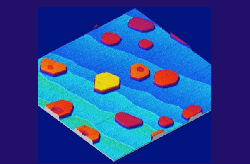
M2 - Material sciences and nano-objects (SMNO-nanomat)
SMNO is an international second year 'research' Master's program offering comprehensive, high-level training on the structural and electronic properties in condensed matter and nanostructures. The objective is to provide students with the theoretical foundations necessary for a deep understanding of material properties, while training them in advanced experimental and computational investigation methods. The skills acquired are directly linked to major contemporary scientific and societal challenges, such as quantum technologies, sustainable energy, AI-based modelling, heritage conservation, and the exploration of matter under extreme conditions.
SMNO targets students who have completed a first year Master's (M1) in physics or an equivalent program, as well as students from partner engineering schools (such as École Polytechnique, Chimie Paris-Tech, ESPCI, etc.), with a strong foundation in solid-state physics, quantum mechanics, and statistical physics, as well as students with a background in physical chemistry.
The M2 program in two sentences
The program, taught in English, consists of courses, practicals, as well as numerical and bibliographic projects, designed in a coherent way as to provide solid foundations. Starting mid-February, students undertake a full-time research internship (minimum 4.5 months, maximum 6 months) in public research units or in the private sector.
International partnerships
The SMNO track has strong international ties with universities in Bologna, Uppsala, Antwerp, and Khatam, through the 'Nanomat International Master' program over two years (M1 and M2), enabling the award of double degrees. Internship opportunities within international collaborations, particularly in Japan and Canada, are under development.
Download the program brochure.
Course program (from september to january)
The first semester curriculum (M2S3) is organised into 5 « tracks » covering a broad variety of materials and issues linked to their study:
Standard learning agreement of 30 ECTS
6 ECTS of core courses (2 course units of 3 ECTS to be chosen from 4) :
6 ECTS de common core methodology courses :
- Materials Investigation Methods (MIM) - 6 ECTS
18 ECTS to choose from the available options :
- Advanced condensed matter physics: Electronic correlations and superconductivity (Adv-CMP) - 6 ECTS
- Nanostructures for optoelectronics and spintronics (OptoSpin) - 6 ECTS
- Nanoelectronics and devices with molecules and nanoparticles (NanoElec) - 6 ECTS PCmat
- Advanced simulations & machine learning in materials science (Adv-Slim) - 6 ECTS PCmat
- Numerical project in Materials Science (NumProj) - 3 ECTS
- 2D materials (2Dmat) - 3 ECTS
- Electronic miscroscopies, X-ray absorption & related techniques (EMAX) - 3 ECTS
- Surfaces, interfaces and nanostructures (Surf) - 6 ECTS PCmat
- Physics of materials under extreme conditions (PMX) - 6 ECTS PCmat
- Disorder in materials : from glass to gem (DIM) - 6 ECTS PCmat
- Interdisciplinarité et Matériaux du patrimoine (5CI231) - 6 ECTS PCmat (in French)
- Modeling dynamics on matter: form atoms to meterials (5CI229) - 6 ECTS PCmat
- Materials for energy (5CI621) - 6 ECTS PCmat (in French)
- Nanomaterials for health (5CI623) - 6 ECTS PCmat (in French)
- Propriétés mécaniques des matériaux solides (5CI633) - 6 ECTS PCmat (lectures in French, documents in English)
- Quantum chemistry : Modeling the properties of electronic structures (5CI228) - 6 ECTS PCmat
Note : A partnership with the Master's in Chemistry, supported by the Institute of Materials Science of the Sorbonne University Alliance (iMAT), allows for the exchange of course units (UE) identified under the designation PCmat.
Research internship (from February, semester M2S4)
The second semester of the M2 consists of a 4.5-6 months compulsory internship (30 ECTS), full time in a research unit of the public or industrial sector, focused on materials and nanosciences, in France or abroad.
Each year, about 200 internship proposals in more than 30 host laboratories are offered to the SMNO-nanomat students.
Contacts
Greg CABAILH
Administration
Evelyne GILBERT-MONGEOT
